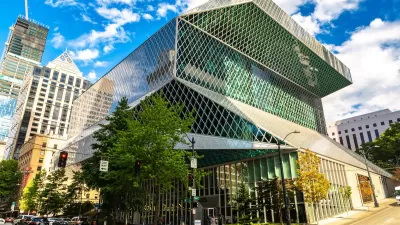The public spaces where people can spend time among strangers without buying something are crucial to healthy cities—and are quickly disappearing.

Writing in Strong Towns, Tiffany Owens Reed vividly describes the pleasures of ‘third spaces,’ those truly public spaces that provide a safe, vibrant place to just exist without having to purchase anything or be engaged in any particular activity.
These spaces attract all kinds of people and facilitate all kinds of activities. They’re organic, uncoordinated, and leisurely. They function like an extension of our own living rooms or backyards. Their value comes from providing a space where strangers can happily be alongside other strangers doing something they enjoy.
Owens Reed doesn’t have an explanation for the phenomenon, but asserts that “there’s something magnetic about spaces where strangers can be alone together, and in our increasingly fragmented and polarized society, this is valuable.” To that end, cities should protect these increasingly rare spaces where all kinds of people can mingle.
Owens Reed recommends three keys to creating good public spaces: keeping them closed to cars; making them “clearly defined and slightly enclosed” to create a sense of safety; and placing them near businesses without making them transaction-focused. “When public parks, squares, and plazas are situated close to practical businesses, it creates a beneficial cycle for them both: public spaces provide places to be while businesses provide options of things to do, both increasing foot traffic, overall vitality, and safety.”
The piece concludes with a provocative question: “What would our cities look like if we designed for all of life, not just a few activities that we can count on for tax revenue?”
FULL STORY: No Purchase Necessary

Planetizen Federal Action Tracker
A weekly monitor of how Trump’s orders and actions are impacting planners and planning in America.

Restaurant Patios Were a Pandemic Win — Why Were They so Hard to Keep?
Social distancing requirements and changes in travel patterns prompted cities to pilot new uses for street and sidewalk space. Then it got complicated.

Maui's Vacation Rental Debate Turns Ugly
Verbal attacks, misinformation campaigns and fistfights plague a high-stakes debate to convert thousands of vacation rentals into long-term housing.

In California Battle of Housing vs. Environment, Housing Just Won
A new state law significantly limits the power of CEQA, an environmental review law that served as a powerful tool for blocking new development.

Boulder Eliminates Parking Minimums Citywide
Officials estimate the cost of building a single underground parking space at up to $100,000.

Orange County, Florida Adopts Largest US “Sprawl Repair” Code
The ‘Orange Code’ seeks to rectify decades of sprawl-inducing, car-oriented development.
Urban Design for Planners 1: Software Tools
This six-course series explores essential urban design concepts using open source software and equips planners with the tools they need to participate fully in the urban design process.
Planning for Universal Design
Learn the tools for implementing Universal Design in planning regulations.
Heyer Gruel & Associates PA
JM Goldson LLC
Custer County Colorado
City of Camden Redevelopment Agency
City of Astoria
Transportation Research & Education Center (TREC) at Portland State University
Camden Redevelopment Agency
City of Claremont
Municipality of Princeton (NJ)





























